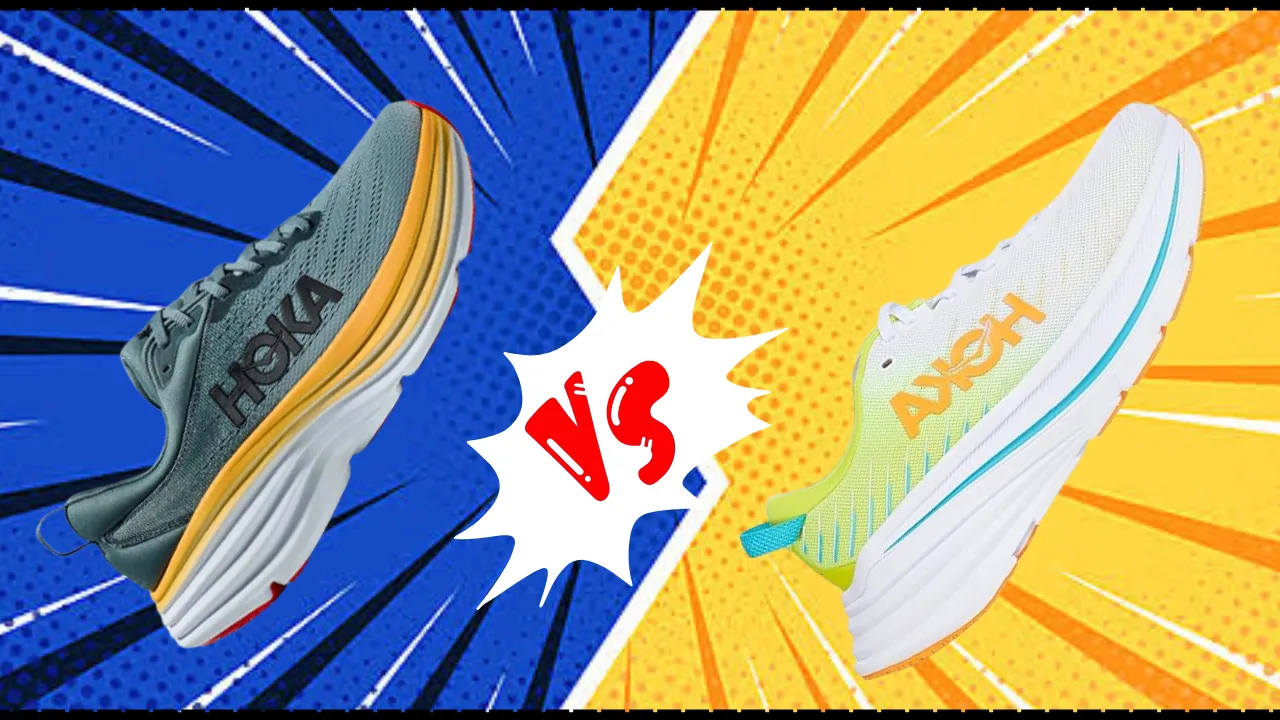The Hoka Bondi series is known for its maximum cushioning and comfort, making these shoes popular for recovery runs, long runs, and easy mileage days.
The latest iterations – the Bondi 8 and the Bondi X – offer signature Hoka plushness but with some key differences.
This comparison reviews the specs, features, and performance of the Hoka Bondi 8 and Hoka Bondi X to help you decide which model works best for your running needs
Similarities And Differences Between Hoka Bondi 8 and Bondi x:
| Feature | Hoka Bondi 8 | Hoka Bondi X |
|---|---|---|
| Launch Date | 2022 | 2021 |
| Stability | Neutral | Neutral |
| Flexibility | Moderate | Moderate |
| Sizing | Men’s 7-15, Women’s 5-12 | Men’s 7-15, Women’s 5-12 |
| Weight | 10.8 oz (men’s), 9.6 oz (women’s) | 11.2 oz (men’s), 10 oz (women’s) |
| Cushioning | High | High |
| Outsole | Rubber | Rubber |
| Midsole | EVA foam | EVA foam + carbon plate |
| Upper | Engineered mesh | Engineered mesh |
| Retail Price | $165 | $340 |
Features Comparison:
Here we will analyze some of the major differences between the features of both Bondi X and Bondi 8 to help you make an informed decision
Materials
The Bondi 8 and Bondi X both utilize Hoka’s signature thick, wide midsoles crafted from compressive EVA foam to deliver supreme shock absorption. That high-volume compressed midsole gives both shoes their characteristic soft, plush ride.


The Bondi X does contain a carbon fiber plate sandwiched in the midsole to add some springiness, but both models retain a pillow-like feel. If you want the most cushioning, the standard Bondi 8 takes the cake.
Durability and Value
The ample rubberized foam used in the outsoles of both the Bondi 8 and Bondi X allows them to withstand significant mileage before showing significant wear. The high-quality rubber holds up well over time and use.


With retail prices of $165 for the Bondi 8 and $340 for the Bondi X, neither shoe is particularly cheap, but their durability helps justify the cost over the long run.
The Bondi X demands a higher price due to its carbon plate technology. For the double price bump, runners need to determine if the responsive carbon plate merits the cost.
Overall, both deliver excellent cushioned performance making them a solid value for high-mileage neutral trainers. The Bondi X offers more tech for more dollars.
Performance Comparison:
Now we will see how both shoes come against each other in terms of performance.
Walking and Running
The plush cushioning and smooth ride of the Bondi 8 make it a dream for recovery runs, long distances, and easy days.
The soft EVA foam absorbs shock extremely well, protecting your joints mile after mile.
The Bondi X matches the 8 in providing a comfortable feel, but the embedded carbon plate adds some bounce and energy return missing from the standard Bondi 8.
Standing and Plantar Fasciitis
With their thick, shock-absorbing midsoles, both the Bondi 8 and Bondi X can help runners with plantar fasciitis by reducing pressure on the feet. However, the Bondi 8 provides a plusher and more flexible experience overall that may cater better to sore feet.
The rigid carbon plate of the Bondi X, while energetic, also reduces forefoot flex which may irritate sensitive plantar fascia tissue. So for PF relief, the Bondi 8 gets the nod.
Final Verdict:
For runners and walkers seeking a supremely cushioned trainer with enhanced comfort, both the Hoka Bondi 8 and Hoka Bondi X deliver on plushness.
The Bondi 8 focuses solely on soft, pillow-like comfort, while the Bondi X balances the signature cushion with increased responsiveness from its carbon plate.
If you want maximum softness for recovery days or have plantar fasciitis, choose the Bondi 8.
But if you want the cushion and a touch of zip for varied paces, go with the Bondi X. Either way, you’ll be running or walking in serious comfort in a Hoka Bondi.

